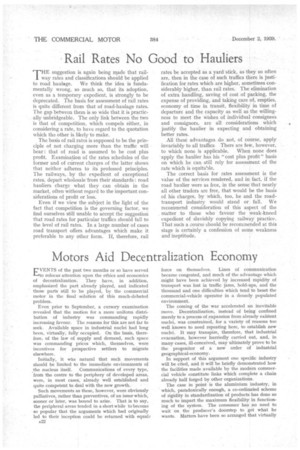Rail Rates No Good to Hauliers
Page 24

If you've noticed an error in this article please click here to report it so we can fix it.
THE suggestion is again being made that railway rates and classifications should be applied to road haulage. We think the idea is fundamentally wrong, so much so, that its adoption, even as a temporary expedient, is strongly to be deprecated. The basis for assessment of rail rates is quite different from that of road-haulage rates. The gap between them is so wide that it is practically unbridgeable. The only link between the two is that of competition, which compels either, in considering a rate, to have regard to the quotation which the other is likely to make.
The basis of rail rates is supposed to be the principle of not charging more than the traffic will bear : that of road is assumed to be cost plus profit. Examination of the rates schedules of the former and of current charges of the latter shows that neither adheres to its professed principles. The railways, by the expedient of exceptional rates, depart wholesale from their standards : road hauliers charge what they can obtain in the market, often without regard to the important considerations of profit or loss.
Even if we view the subject in the light of the fact that competition is the governing factor, we find ourselves still unable to accept the suggestion that road rates for particular traffics should fall to the level of rail rates. In a large number of cases road transport offers advantages which make it preferable to any other form. If, therefore, rail rates be accepted as a yard stick, as they so often are, then in the case of such traffics there is justification for rates which are higher, sometimes considerably higher, than rail rates. The elimination of extra handling, saving of cost of packing, the expense of providing, and taking care of, empties, economy of time in transit, flexibility in time of departure and the capacity as well as the willingness to meet the wishes of individual consignees and consignors, are all considerations which justify the haulier in expecting and obtaining better rates.
All these advantages do not, of course, apply invariably to all traffics There are few, however, to which none is applicable. When none does • apply the haulier has his "cost plus profit" basis on which he can 'still rely for assessment of the rate which is equitable.
The correct basis for rates assessment is the value of the services rendered, and in fact, if the road haulier were as free, in the sense that nearly all other traders are free, that would be the basis of his charges, by which, too, he and the roadtransport industry would stand or fall. We recommend consideration of this aspect of the matter to those who favour the weak-kneed expedient of slavishly copying railway practice. That such a course should be recommended at this stage is certainly a confession of some weakness and ineptitude.




































































